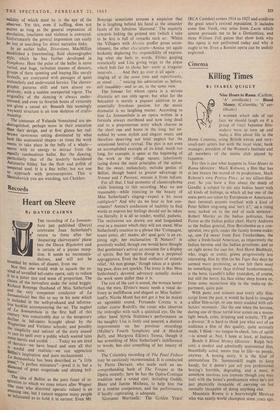Records
Heart on Sleeve
By DAVID CAIRNS
THE recording of La Sonnam- bula just published (Decca) celebrates Joan Sutherland's 0 return to form after her `despairing clairvoyante' phase (see the Decca Rigoletto) and is certain of a joyous recep- tion. It needs no recommen-
dations, and will not be troubled by noises of dissent, from me.
Not that one would wish to squash the re- vival of so-called bel-canto opera, only to reduce it to a juster size and sense of proportion. The Claims of the revivalists make the mind boggle. Richard Bonynge (husband of Miss Sutherland and the very competent conductor of La Sonnambula) has this to say in his note which is included in the well-produced and informa- tive booklet accompanying the set. The neglect of La Sonnambula in the first half of this CentiirY 'was conceivably due to the temporary decline in bel-canto brought about by the Wagnerian and Verismo schools; and possibly theslhiPliett .. y and naïveté of the story ceased to cast its spell over a public which wanted tales More heroic and sordid. . . . Today we are tired 91 heroics—we have heard and seen all that 1,s sordid and realistic—we can appreciate ure_llihi's inspiration and pure enchantment jewel " Sonnambula has been described as "a little " a onaperfect miniature"—jewel it is, but a Lance.' ia of great magnitude and shining bril- 1 idea of Bellini as the pure fount of in- piration to which we must return after Wagner (the man who distorted operatic values) is an arnus. ing one, but I cannot suppose many people so infatuated as to hold it in earnest. Even Mr. Bonynge sometinfes arouses a suspicion that he is laughing behind his hand at the absurder facets of his fabulous 'diamond.' The masterly synopsis linking the printed text (which I take to be his) is full of remarks such as: 'Whilst the Villagers with Alessi() proffer pious aston- ishment, the other characters—Amina yet again brokenly deploring the impossibility of express- ing what she feels in words, Elvino gasping ecstatically and Lisa giving reign to the pique which bids fair to choke her—enter at irregular intervals. . . . And they go over it all again . . singing all at the same time and repetitiously, as usual . . .' voicing his admiration as before, still inaudibly—and so on, in the same vein.
The listener for whom opera is a serious dramatic art can only agree; but what for the belcantist is merely a piquant addition to an essentially frivolous passion, for the music dramatist is no laughing matter. According to him La Sonnambula is an opera written in a formula always moribund and now long dead and to a preposterous story which charms in the short run and bores in the long, but en- nobled by some stylish and elegant music and therefore deserving not total neglect but the occasional festival revival. The plot is not even an accomplished example of its kind; much too long, for example, is spent at the beginning of the work in the village square, laboriously laying down the main principles of the action. But the sweet, melancholy, melodic genius of Bellini, though heard to greater advantage in Norma and 1 Puritani, rescues it from tedium.
For all that, I had moments of claustrophobia while listening to this recording. May we not reasonably—while rejoicing in the beauty of Miss Sutherland's singing—expect a bit more espieglerie? And why do we hear so few con- sonants? Amina's confession of inability to find words to express her feelings should not be taken too literally. It is all so tender, wistful, pathetic. The recitations are drawn out and languished over in a manner which they will not stand. Miss Sutherland's reaction to a phrase like 'Compagne, teneri amici, ahl madre, qual goia' is an ex- piring sigh; her exclamation 'II Notaro?' is positively wailed, though one would have thought that gentleman's arrival an occasion for a display of spirits. But her spirits droop in a perpetual appoggiatura. Even the final outburst of ecstatic relief, Vitt non giunge,' though taken at a spank- ing pace, does not sparkle. The irony is that Miss Sutherland's devoted advocacy actually makes the work seem duller than it is.
The rest of the cast is sound, the women better than the men. Elvino's music needs a vocal de- livery as mellifluous and elegant as Miss Suther- land's; Nicola Monti has not got it but he makes an agreeable sound. Fernando Corena is a rather coarse Rodolfo, the count who observes the imbroglio with such a quizzical eye. On the Other hand Sylvia Stahlman's performance as the naughty Lisa is lively and assured, a distinct improvement on her previous recordings (Mahler's Fourth Symphony and A Masked Ball), and Margreta Elkins's Teresa, though it has something of Miss Sutherland's indifference to words, has also something of her beauty of tone.
The Columbia recording of The Pearl Fishers may be cautiously recommended. It is conducted by Pierre Dervaux, who made such an un- comprehending hash of The Trojans at the Opdra recently; here he has the Opera-Comique tradition and a sound cast, including Gedda, Blanc and Janine Micheau, to help him rise to a routine competence, and the performance, if hardly captivating, is adequate.
`Giovanni Martinelli: The Golden Years'
(RCA Camden) covers 1914 to 1927 and confirms the great tenor's revived reputation. It includes some fine Verdi, two arias from Lucia which almost persuade me to be a Donizettian, and three William Tell pieces that show both why this opera is not performed today and why it ought to be. Even a Rossini opera can be unduly neglected.


































 Previous page
Previous page